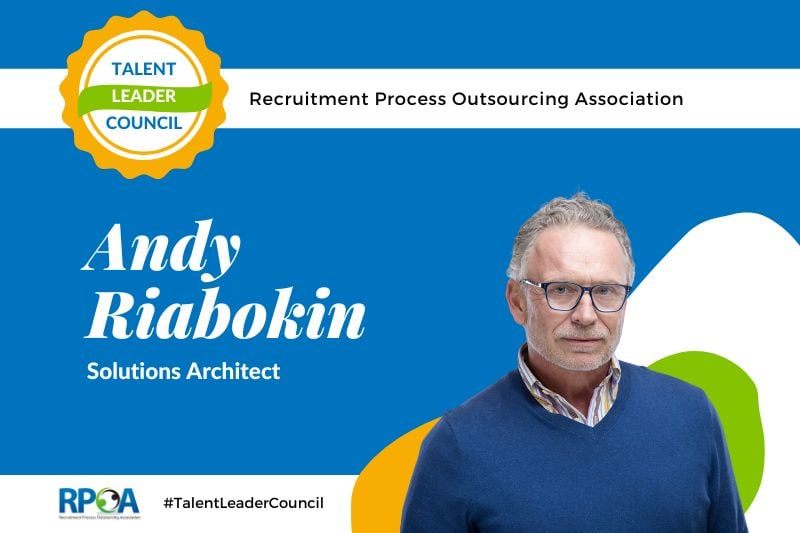
As artificial intelligence (AI) and new technologies disrupt talent acquisition, many open questions remain about their effect and application. In this Talent Leader Council series, Lamees Abourahma of RPOA spoke with Andy Riabokin, a veteran recruiter, systems architect, and AI expert, to gain insights on trends in AI and talent acquisition technology like ChatGPT. From his vast experience leading artificial intelligence strategies and discussions with business leaders, Riabokin provided invaluable insights. He addressed key issues around the differences between AI and Recruitment Process Automation (RPA), predictions for automation in the recruiting field, and new emerging approaches. The following is an AI-generated and human-edited version of the interview.
RPOA: How Are AI And New Technologies Like ChatGPT Affecting Talent Acquisition?
Riabokin: AI significantly affects talent acquisition. AI is being applied in new ways, with products and services emerging based on job descriptions and resume data sets. The industry will see an initial surge in AI applications, but the focus may eventually shift back to more human-centric approaches that emphasize authentic communication to evaluate competencies. AI solutions like ChatGPT and other technologies are currently being used well for recruitment process automation tasks like creating job description-based call guides and summarizing candidate answers. However, I would suggest a compliant competency assessment still requires human evaluation.
Q: What Is the Difference Between AI And Recruitment Process Automation (RPA)?
Riabokin: There’s an important distinction between AI and RPA. AI really focuses on very complex decision-making involving large datasets, massive processing power, and complex algorithms to model real-world outcomes, with real-world consequences that must be carefully considered. I define AI as follows:
AI = (data + processing power + algorithm) / consequence of outcome
An example of the far end of the spectrum of AI is the autonomous vehicle gathering enormous amounts of data, requiring MASSIVE processing power and a hyper-complex algorithm to safely navigate roads with the consequence of harming people and property. In contrast, at the low end of the spectrum, AI applications like ChatGPT are very well suited for more straightforward process automation tasks using much smaller data sets, like the conversational text from an interview without serious implications, like death. For example, AI solutions like ChatGPT can easily generate interview questions from a job description or summarize candidate answers concisely. So in this use case, solutions like ChatGPT operate with very little processing power applied, with a much simpler algorithm, and can still deliver value back to the business.
Q: How Will AI Affect Talent Acquisition Processes And Functions?
Riabokin: Some experts predict up to 90 percent of talent acquisition processes could be automated through AI. However, I’m more cautious. The pendulum may eventually swing back toward human decision-making and evaluation. Customers are seeking ways to rank, prioritize, and make hiring decisions about candidates by using AI.
If someone wanted to build a true ranking model, I would start with collecting interview data of the organization so it can be explained in a scatterplot or regression analysis based on competency assessment models authenticated by human subject matter experts of the company. AI can be an over-complex solution with business consequences, like losing a class action lawsuit because a juror with an 8th-grade education doesn't understand AI. For ranking, typically, there are only 4 or 5 competencies that need to be assessed to determine fit. Again, I prefer simple, empirical models that are easy and would be easy for a jury to understand. Companies should not rely too heavily on external factors and instead evaluate candidates within the context of their competency and on whether they fit within the team.
Q: What New Trends Do You See In Applying AI and ChatGPT To Recruiting?
Riabokin: Over the past year, I've seen my company's engineering team consumed with exploring open AI and ChatGPT features. It’s been exciting for the entire technology industry. I predict an initial surge of AI recruiting products based simply on resume and job description data. However, in the recruitment and talent acquisition functions within an overall organization, I believe the unique value is in the interview data that captures a candidate's competencies based on human authentication.
As tools develop to rank and prioritize large volumes of candidates, I still see a role for augmented human decision-making. Companies must first ensure they understand their own culture and competency baselines to apply any rankings appropriately.
Q: What Advice Do You Have For RPO Providers Who Want To Adopt Technology Ahead Of The Curve To Stay Competitive And Meet Clients' Expectations?
Riabokin: Today I would focus on Recruitment Process Automation solutions to keep recruiters' morale high to be more productive. But most importantly, deliver RPO solutions that give ROI back to the client by reducing their screening time and time it takes to reach consensus to make impactful hiring decisions. That’s how to win new business in this market.
Stay away from any solutions that offer AI “decision making”. Today, there are very important court cases being tried based on AI’s interpretation of “biometric” data captured during an interview to include or exclude a candidate from an employment opportunity. AI decision making is a slippery slope and lawyers smell blood in the water. Hold your clients accountable to make human hiring decisions based on compliant interview data collected by the RPO. That’s a good path for success.
Gain more insights directly from talent leaders. Watch global talent acquisition directors and RPO executives share market insights at the RPOA annual conference that took place on September 25-26, 2023.














